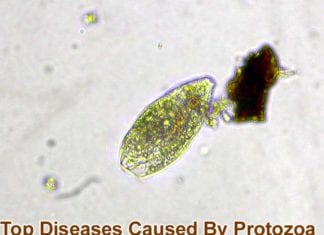
A parasitologist is a medical specialist whose primary focus is parasites, from protists and insects to bacteria and viruses.
In this page, explore the step on how to become a parasitologist, available tracks within parasitology, educational qualifications and the average salary in the United States.
A parasitologist can either study and analyze their lifecycles or develop a treatment for patients that suffer from parasitic diseases.
Sometimes, a parasitologist is involved only in research and/or treatment of diseases caused solely by eukaryotic parasites – protists, worms, and insects.
Top 12 Diseases Caused By Protozoa
Top 14 Most Infectious and Deadliest Diseases Caused By Bacteria
How To Become A Parasitologist?
There are two tracks for becoming a parasitologist:
Research track:
- Complete high school with a high GPA;
- Join a school with a major in parasitology;
- Get a Bachelor of Science degree in Biology or related sciences (4 years);
- Get a Masters in Biology/Parasitology (2 years);
- Get a Ph.D. in parasitology (at least 3 years);
- Work as a research fellow in a parasitology lab or a similar research facility;
Medical parasitologist degree track:
- Complete high school with a high GPA;
- Complete the 4 years Bachelor degree in Life Sciences or a related major;
- Pass the Medical School Admission Test (MCAT);
- Complete the 4-year training for a medical degree (M.D.);
- Pass the three parts of the United States Medical Licensing Exam (USMLE);
- Join an internal medicine residency for 3 years;
- Join an infectious diseases fellowship (3 years);
- Complete an additional year for training in parasitology;
![]()
Average Salary for Parasitologists
An average salary for a parasitologist in the USA ranges between $75,299 and $133,440 depending on the type of work they are doing and the overall experience.
![]()


















